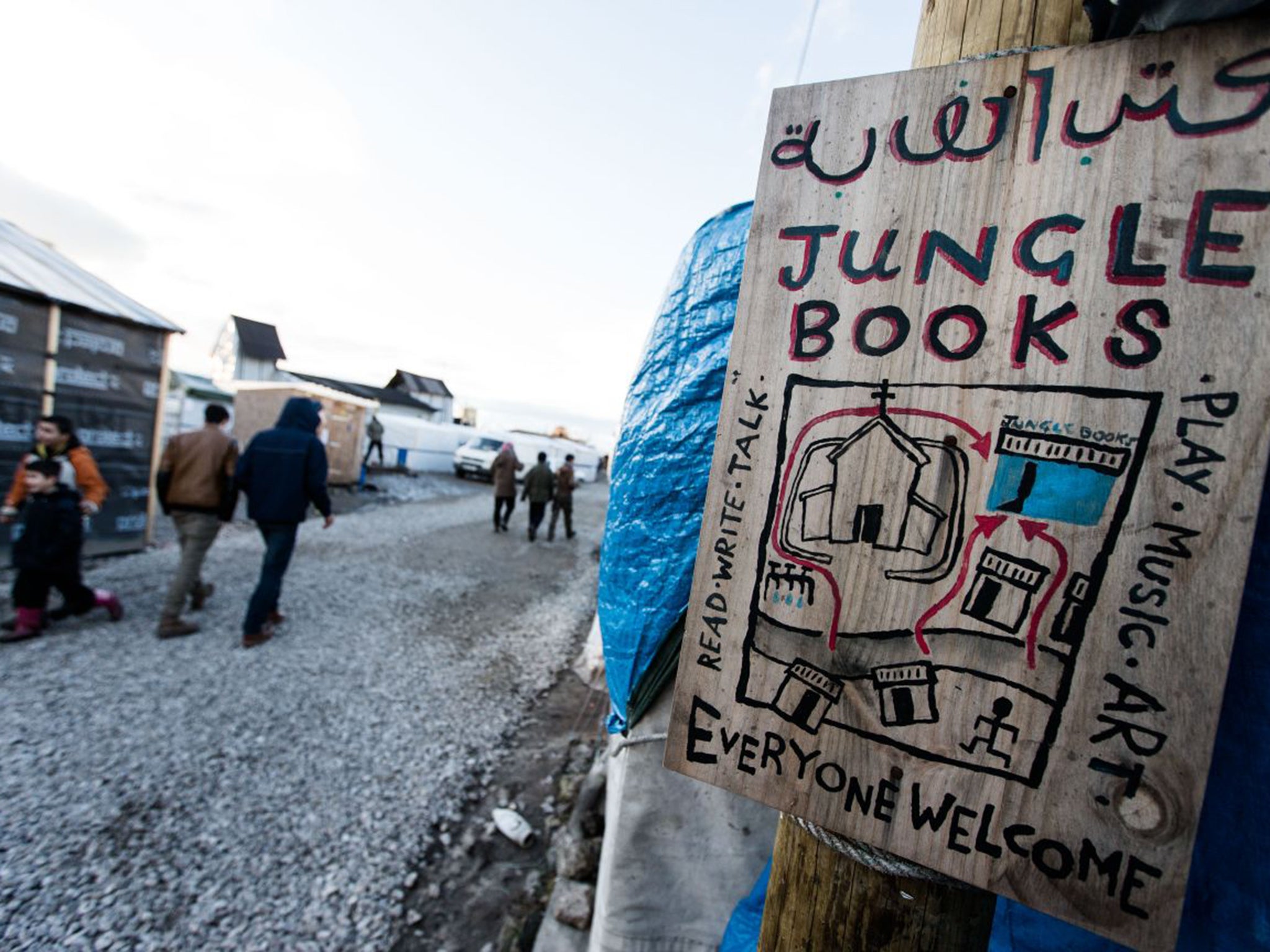Glastonbury Festival volunteers flock to Calais Jungle to offer help
'The powers that be don’t want to declare this a state of emergency – which it is'

On a plot of muddy land next to a makeshift school in the Calais refugee camp, a group of men are erecting a skeletal structure from planks of wood. When completed, and covered in tarpaulin, this will be a sports room for the camp’s children, replete with punch bags.
The men – three British and one American – are members of an unlikely task force. Part of a growing number of volunteers with extensive experience in staging music and art festivals, they are applying their skills to the plight of the Calais refugees.
“We have a particular way of working which makes us very suitable to this situation,” says Kit Johnson, a 32-year-old traveller originally from Macclesfield. “We might not make it pretty, but we can build things fast and make them safe.”
He has worked at festivals for many years, swiftly making fields around the world hospitable to thousands of people. For Johnson and the others, it was a short step to tackling the difficulties posed by the camp.
“At festivals, things never ever go to plan,” he says. “You have to roll with the punches. It’s an informal settlement and pretty much anything can happen.”
He counts seven friends from festivals currently working in the camp – with more soon to arrive. Far from treating this as a social affair, the festival community is brought here by pressing need in the camp.
Many of the aid organisations that typically organise refugee camps are not present in the Jungle because of the French state’s reluctance to frame the situation in Calais as a humanitarian crisis. Aid agencies operate under strict remits and often only when asked to do so by a country’s government. The French authorities have so far resisted inviting the UNHCR, the United Nations’ refugee agency, into the camp.
The Red Cross, which ran the former Sangatte camp near Calais, is also currently absent. But that will change soon because of what it sees as “increasing levels of humanitarian need”. It recently announced it will offer support to agencies working in the camp – falling short of direct involvement.
With the two major players in the field absent, Médecins sans Frontières and Médecins du Monde run the camp – thought to be home to up to 7,000 refugees – with a handful of small local NGOs. Volunteers are quick to praise their efforts but also express disbelief at the lack of formal organisation. There is no system in place to record missing persons – an important task complicated by the refugees’ reluctance to leave a paper trail. The schooling of the camp’s children is provided by volunteers, as are, in many cases, daily meals.
At a warehouse stacked with canned food, sacks of onions and other basics, Steve Bedlam explains he is struggling to balance his role as director of the Refugee Community Kitchen with organising the Common Field at Glastonbury.
“I’ve started taking Thursdays off to work on Glastonbury, which I’m having to do over the phone. It’s difficult. Not to belittle the festival industry at all, but it’s hard to sit there and think about what DJ to book when I know there are thousands of people walking from Syria.”
Calais refugee camp is at 'crisis point'
Show all 8He arrived in Calais in October with the intention of spending two weeks setting up a kitchen, before heading to Spain. However, he has found the demands of the camp so pressing that he is yet to leave.
As a director of a music charity, he has spent time in refugee camps in the Western Sahara. While it is hard to calculate how many people the charity feeds, they get through 3.3 tons of rice a week, 1,600 litres of cooking oil and 99,000 teabags.
“Where are the Red Cross and the UNHCR?” he asks. “The powers that be don’t want to declare this a state of emergency – which it is.”
A fellow long-time Glastonbury organiser, Liz Clegg, runs the women and children centre. It provides care for the camp’s unaccompanied children, of whom there are about 300. “These children are often dealing with post-traumatic stress disorder and can be extremely hard to deal with,” she says. “I only have volunteer support and often it’s short term. Caring for these children requires particular skills and training, which most volunteers don’t have.”
Ms Clegg, a traveller, has been in Calais since Glastonbury finished in June. She came to deliver thousands of wellies and rain ponchos discarded at the festival site. She stayed to help, a decision made possible because of her itinerant lifestyle; many of her fellow festival volunteers need to be in England only for the summer.
Back at the partially constructed sports room, there is an hour until sunset. Mr Johnson looks out over the sea of tents. “There’s a lot here that reminds me of festivals,” he says. “The sounds of generators, the smell of fried food and the music you hear playing when you go past the Eritrean bars.” A wit among the volunteers offers a pithier assessment: “It’s like a muddy Soviet Butlins.”
Subscribe to Independent Premium to bookmark this article
Want to bookmark your favourite articles and stories to read or reference later? Start your Independent Premium subscription today.

Join our commenting forum
Join thought-provoking conversations, follow other Independent readers and see their replies